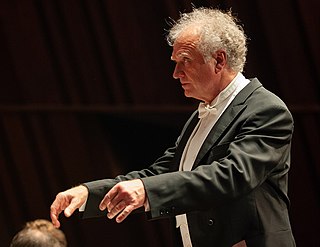Related Research Articles
Klaus Mertens is a German bass and bass-baritone singer who is known especially for his interpretation of the complete works of Johann Sebastian Bach for bass voice.
James Taylor is an American tenor, known for singing the Evangelist in works of Johann Sebastian Bach.
Adalbert Kraus is a German tenor in opera and concert, known for singing the works of Johann Sebastian Bach.
Fritz Werner was a German choral conductor, church music director, conductor, organist and composer. He founded the Heinrich-Schütz-Chor Heilbronn in 1947 and conducted it until 1973.
Pforzheim Chamber Orchestra is an internationally known German chamber orchestra based in Pforzheim.
Claudia Hellmann was a German contralto concert and operatic singer, primarily with the Stuttgart Opera.
Franz Kelch was a German bass-baritone lied and oratorio singer. His discography includes works of Johann Sebastian Bach, Dieterich Buxtehude, George Frideric Handel, and Claudio Monteverdi.
Ingeborg Reichelt is a German soprano singer known for her interpretation of works by Johann Sebastian Bach.
Ursula Buckel was a German soprano singer, known for singing works of Johann Sebastian Bach.
Hildegard Laurich, was a German classical contralto singer.
Dantes Diwiak is a classical tenor, who grew up and has worked mostly in Germany.

Diethard Hellmann was a German Kantor and an academic in Leipzig, Mainz and Munich.

Du Hirte Israel, höre, BWV 104, is a church cantata by Johann Sebastian Bach. He composed it for the second Sunday after Easter in Leipzig and first performed it on 23 April 1724.

Ulrich Cordes is a German tenor.

Ich bin ein guter Hirt, BWV 85, is a church cantata by Johann Sebastian Bach. He composed it in Leipzig for the second Sunday after Easter and first performed it on 15 April 1725.
Georg Poplutz is a German tenor, a soloist in Baroque music, opera and oratorio, and a Lied singer. He has been a member of vocal ensembles such as Johann Rosenmüller Ensemble and Cantus Cölln, and has participated in a project to record the complete works of Heinrich Schütz.
Antonia Fahberg was an Austrian lyric soprano in opera and concert. Her career focused on the Bavarian State Opera where she sang for 25 years. She performed regularly in concerts and recordings with Karl Richter and the Münchener Bach-Chor, and appeared at major opera houses and festivals in Europe.

Johannes Hill is a German baritone in concert and in oratorios, who has performed internationally. Singing in choirs from age 10, he has performed major roles in oratorios, such as both Jesus and Pilate in Bach's Passions, and Pope Francis in the premiere of Laudato si'. He has also performed in vocal ensembles such as Kammerchor Stuttgart and Collegium Vocale Gent.

Ralf Otto is a German conductor, especially known as a choral conductor and academic teacher. He founded the Vokalensemble Frankfurt, focused on contemporary music and winning competitions including Let the Peoples Sing. Since 1986, he has been director of the Bachchor Mainz, with a tradition of performing Bach cantatas in broadcast church services. He added late romantic and contemporary works to their repertoire and made international tours with them. They made world premiere recordings of some cantatas by Bach's oldest son, Wilhelm Friedemann Bach, among other recordings. Otto was professor of choral conducting at the Folkwang Hochschule from 1990 to 2006, when he took the same position at the Hochschule für Musik Mainz.
Anne Bierwirth is a German contralto, focused on concerts and recordings of sacred music, appearing internationally. Besides the standard repertoire such as Bach's Christmas Oratorio, she has explored rarely performed Baroque music such as Bach's St Mark Passion and Reinhard Keiser's Passion oratorio Der blutige und sterbende Christus.
References
- 1 2 Kurt Huber on bach-cantatas
- ↑ Konzerte des zbc von 1965 bis 1969 Archived 2009-02-15 at the Wayback Machine Chronology of the Zuercher Bach Chor (in German)
- ↑ Trierer Bachchor (in German)
- ↑ Konzerte mit der Ulmer Kantorei Archived 2011-07-25 at the Wayback Machine (in German)
- ↑ Fritz Werner & Heinrich-Schütz-Chor Heilbronn & Pforzheim Chamber Orchestra Bach Cantatas & Other Vocal Works
- ↑ Cantatas Volume 1 review of John Quinn, 2004
- ↑ 20 Jahre Parktheater Meilen Archived 2011-07-07 at the Wayback Machine 20 years Park Theatre Meilen, Charlie Wunderly, November 1969(in German)
- ↑ Heinrich-Schütz-Chor Heilbronn Konzertchronik Archived 2011-03-11 at the Wayback Machine (in German)
- ↑ Chronik Philharmonischer Chor [ permanent dead link ] (in German)
- ↑ Konzerte Archived 2011-07-18 at the Wayback Machine concerts of Oratorienchor Ellwangen (in German)